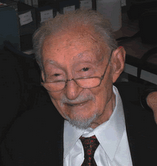Seymour Lubetzky

Seymour Lubetzky (April 28, 1898 – April 5, 2003) was a major cataloging theorist and a prominent librarian. Born in Belarus as Shmaryahu Lubetzky, he worked for years at the Library of Congress. He worked as a teacher before he immigrated to the United States in 1927. He earned his BA from UCLA in 1931, and his MA from UC Berkeley in 1932. Lubetzky also taught at the UCLA Graduate School of Education and Information Studies, then the School of Library Service.
Fluent in six languages, Lubetzky published three groundbreaking books that greatly advanced the discipline of cataloging, the organization of knowledge, and modern research methods, still influential in areas of information technology. Librarianship in particular and information science in general had not been revolutionized as much since the likes of Antonio Panizzi, Charles Ammi Cutter or Paul Otlet. Cataloging Rules and Principles and Principles of Cataloging, as well as several periodical articles, solidified Lubetzky as one of the most significant influences in his field. Lubetzky's theory of cataloging went far beyond the Dewey Decimal System. He developed a rationalized approach to catalog code design, one that is even more relevant today as current cataloging principles are revisited and revised for a digital environment.
His unfinished book, Code of Cataloging Rules... unfinished draft (1960), was the basis for modern cataloging adopted by the first International Conference on Cataloging Principles (1961) held in Paris, France, called the "Paris Principles." The code which eventually emerged from the conference was a landmark in the history of universal bibliographic control. In 1967 it developed into the Anglo-American Cataloging Rules, which subsequently has been revised over the years.
Lubetzky built upon and expanded the ideas of Panizzi and Cutter to create a vision of a catalog that was truly user-friendly. Whereas Cutter had not distinguished between the idea of a "book" and the idea of the "work" in formulating his objectives, Lubetzky contrasts the two ideas, bringing back into play Panizzi’s original emphasis on the relationship between a title and all of the different editions of that title that might exist. Lubetzky’s idea was that relationships among all the editions and variations of a given work and the author of that work, in all variations of the author’s name, must be established and brought together so they can be found in one place. All the works of a given author, in all their editions, should be linked together. As he said years later, at a 1977 conference in Los Angeles called “The Catalog in the Age of Technological Change,” “The catalogue has to tell you more than what you ask for…. The answer of a good catalogue is not to say yes or no, but … to tell [the user] that the library has [the item] in so many editions and translations, and you have your choice” (From an audio clip posted by William Denton )
Lubetzky was immortalized in two books, entitled Seymour Lubetzky: Writings on the Classical Art of Cataloging and Future of Cataloging: The Lubetzky Symposium.
Just before his 104th birthday, the American Library Association awarded Lubetzky its highest honor, an honorary lifetime membership.
See also
- List of famous librarians
|